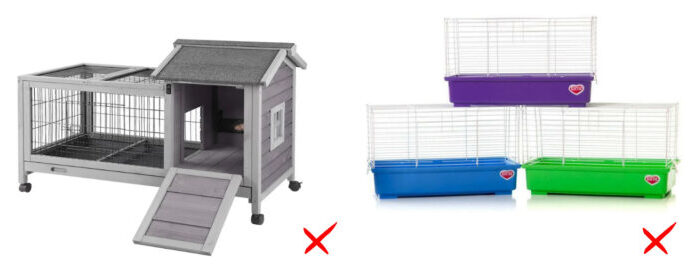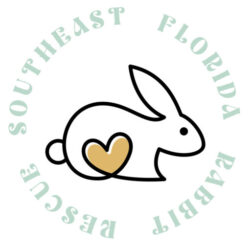Save a Life Today!
FOSTER A RESCUE RABBIT OR GUINEA PIG
Southeast FL Rabbit Rescue is a 100% volunteer run and foster home based small animal rescue in South Florida. We do not have a shelter facility and our ability to take in new rescues depends on the availability of a foster home. WE can cover the cost of medical care and loan fosters supplies. We just need YOU to give them a safe indoor space and lots of love.
No experience required! We offer FREE online Bunny 101 & Guinea Pig 101 classes weekly and will be available to answer any questions.
Foster Agreements (PLEASE READ)
1. Ownership and Return of Animals
I acknowledge that any foster animal(s) remain the property of Southeast FL Rabbit Rescue and must be returned upon request. If I refuse to return the animal(s), Southeast FL Rabbit Rescue will pursue legal action to reclaim them as the legal owner and I will be responsible for all related court fees and expenses.
2. Foster Rights
I understand that I do not have the right to keep, adopt, transfer, or rehome the foster animal(s). If I can no longer provide care as detailed in the provided Care Guide, I will return the animal(s) to Southeast FL Rabbit Rescue.
- To adopt a foster animal, I must apply, be approved and pay the adoption fee.
3. Background Certification
I certify that no one in my household has been charged with or convicted of animal cruelty, neglect, or abandonment.
4. Housing Requirements
I agree to house the foster animal(s) indoors only, ensuring they are never taken outdoors. I will provide:
- Rabbits:
- Unlimited hay, water, and food as per the Care Guide.
- A clean, well-lit living space of at least 4ft x 4ft, 16sq ft with air conditioning.
- 3-4 hours of supervised “free-roam” time daily in a “bunny-proofed” area.
- Guinea Pigs:
- Unlimited hay, water, and food as per the Care Guide.
- A clean, well-lit living space of 2ft x 4ft, 8sq ft with air conditioning.
- 1-2 hours of supervised time outside the enclosure daily for socialization and exercise.
5. Socialization and House Training
I agree to provide daily socialization to ensure the foster animal(s) are sociable and ready for adoption.
- If fostering a rabbit I will follow instructions for litter-box training.
6. Progress Reports
I will submit weekly / monthly online progress reports for the duration of the foster term.
7. Liability for Damages
I agree to “bunny proof” the room / area where my foster will be housed and hold Southeast FL Rabbit Rescue harmless from any direct or consequential damages that may arise out of fostering the animal(s).
8. Transportation Responsibilities
I understand I must transport the animal(s) to necessary vet exams, spay/neuter surgeries, and other appointments as required by Southeast FL Rabbit Rescue.
9. Veterinary Care
All veterinary care must be pre-authorized by Southeast FL Rabbit Rescue with one of their approved veterinary partners. I agree to personally cover costs for any unapproved veterinary care. Any supplies or medications provided are solely for the foster animal(s) and not for other pets.
10. Child Safety
I acknowledge that rabbits and guinea pigs are fragile. Children will not be permitted to pick up or handle the foster animal(s) without supervision, and they will never be left unsupervised outside their enclosure.
11. Other Pet
I will notify Southeast FL Rabbit Rescue before introducing any new pets into the household. Unless authorized, all foster animal(s) will be kept separated from my existing pets, as potential interactions may lead to injury or illness.
- For household with predator pets like cats and dogs, there must always be two barriers between them and the foster animal(s) enclosure. Predator pets will never be left unsupervised with the foster animal(s).
12. Supplies
Fosters will receive a “foster starter pack” of supplies: see below. Fosters must return “permanent” supplies such as X-pens, cages, carriers and litter-boxes undamaged and in the same condition as received. Fosters are responsible for replenishing “perishable” supplies such as litter, hay, and food pellets as needed and provide fresh leafy greens and vegetables daily.
- Provided Supplies:
- Rabbits: X-pen, hard carrier, litter box, litter, hay, pellets.
- Guinea Pigs: Habitat, hard carrier, litter, hay, pellets.
AGE REQUIREMENTS: 18+ with valid Florida ID
LOCATIONS: At this time we are only accepting foster homes in Miami-Dade and Broward counties.
* If you live outside of these areas we can recommend a closer rescue.
TERM FOSTER: foster a rabbit or guinea pig for 4-6 months or until adoption.
- FINDER FOSTER: those fostering an animal that they found.
- OWNER FOSTER: those fostering a pet that is being re-homed.
TEMP FOSTER: foster a rabbit or guinea pig for 2 weeks – 2 months or as needed.
FOSTER TO ADOPT: foster a rabbit or guinea pig for 2-4 weeks before committing to adoption or becoming a term foster. This program is for first time owners and/or those who want to make sure the rabbit or guinea pigs is the right fit.
SANCTUARY FOSTER: long-term or life-long foster. Due to a medical condition or advanced age some rabbits and guinea pigs may not be eligible, or likely, to be adopted. Some will only be with us for a few weeks or a few months and will need a fospice “end of life” foster.
INDOORS ONLY: Domestic rabbits should be housed and kept indoors at all times. Taking rabbits outdoors is not only stressful for them but exposes them to many dangers, such as: RHDV II, predators, parasites (fleas, ticks, mites, lice, fly strike, bot flies, etc.) and heatstroke (rabbits begin to show signs of overheating at just 76°F / 24°C).
- NO: patios, porches, backyards, or walks/outdoor playtime.
CENTRAL: The rabbits enclosure should be in an adults bedroom or a central, high-traffic area like the living room.
- NO: laundry room, kitchen, bathroom, garages, patios, etc.
FREE ROAM TIME: The rabbit cannot stay in the enclosure all of the time and will need 3-4 hours of daily supervised free-roam time to explore and exercise in a “bunny-proofed” room.
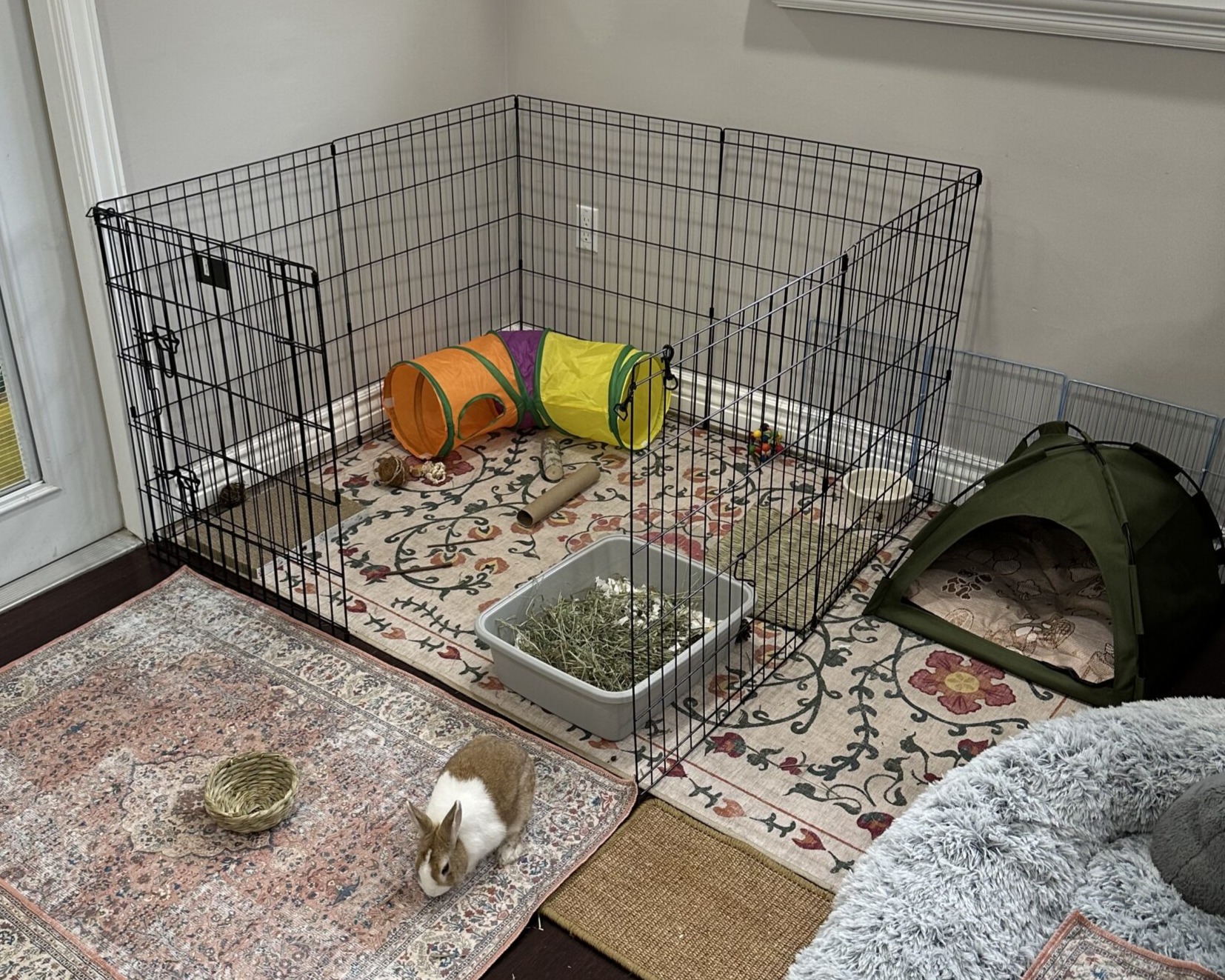
MINIMUM RABBITAT SIZE:
4ft x 4ft, 16sq ft 1 dwarf sized rabbit (2-4lb)
4ft x 6ft, 24sq ft 1 medium sized rabbit (5-9lb) or a pair of dwarfs
6ft x 6ft, 36sq ft 1 large breed rabbit (10-14lb) or a pair of medium sized rabbits or a trio of dwarfs
FREE ROAM giant breed rabbits (15lb+)
A single dwarf rabbit needs a minimum 4ft x 4ft, 16sq ft living space when enclosed, preferably 4ft x 6ft.
This will be their “home-base” for when you cannot supervise them. For each additional rabbit (or 4lb of body weight), add 8-12sq ft to their living space to maintain a healthy and harmonious environment and prevent fighting and bulling due to resource guarding amongst multiple rabbits. Giant breeds will need an entire room to free roam all of the time.
Hutches, cages and dog crates DO NOT provide enough room for exercise and overall well-being for rabbits. Not providing enough space can lead to a host of problems due to depression and frustration. These often lead to rabbits pacing back and forth, cage chewing (which can damage their teeth), and cage aggression (growling, lunging and biting at hands that reach into their space or during cleaning). Health issues such as obesity, heart disease, muscle atrophy, skeletal changes, and infections are more common. Cages and hutches are also notoriously difficult to keep clean as rabbits end up using the entire space as a litter box.
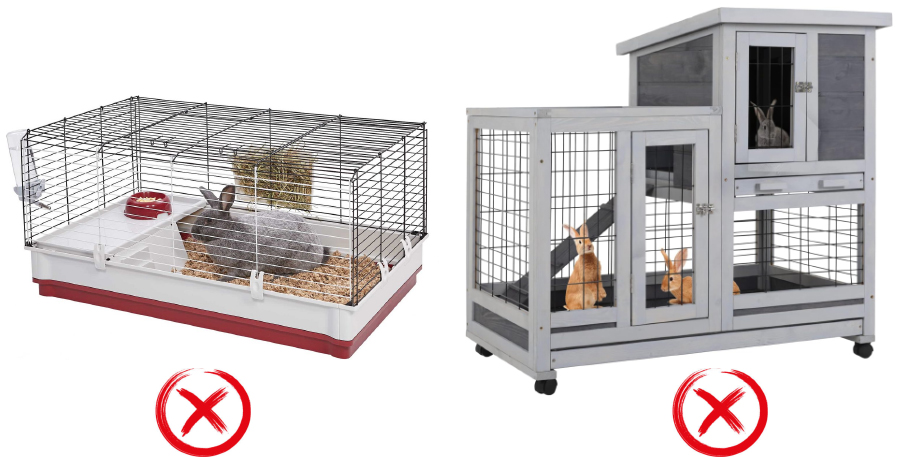
NEVER SOLO: Guinea pigs are extremely social animals and should be kept in a herd with at least 1 other guinea pig.
INDOORS ONLY: Guinea pigs should be housed and kept indoors at all times. Taking them outdoors is not only stressful for them but exposes them to many dangers, such as: escaping, predators, parasites and heatstroke.
- NO: patios, porches, backyards, or walks/outdoor playtime.
CENTRAL: The enclosure should be in an adults bedroom or a central, high-traffic area like the living room.
- NO: laundry room, kitchen, garages, patios, etc.
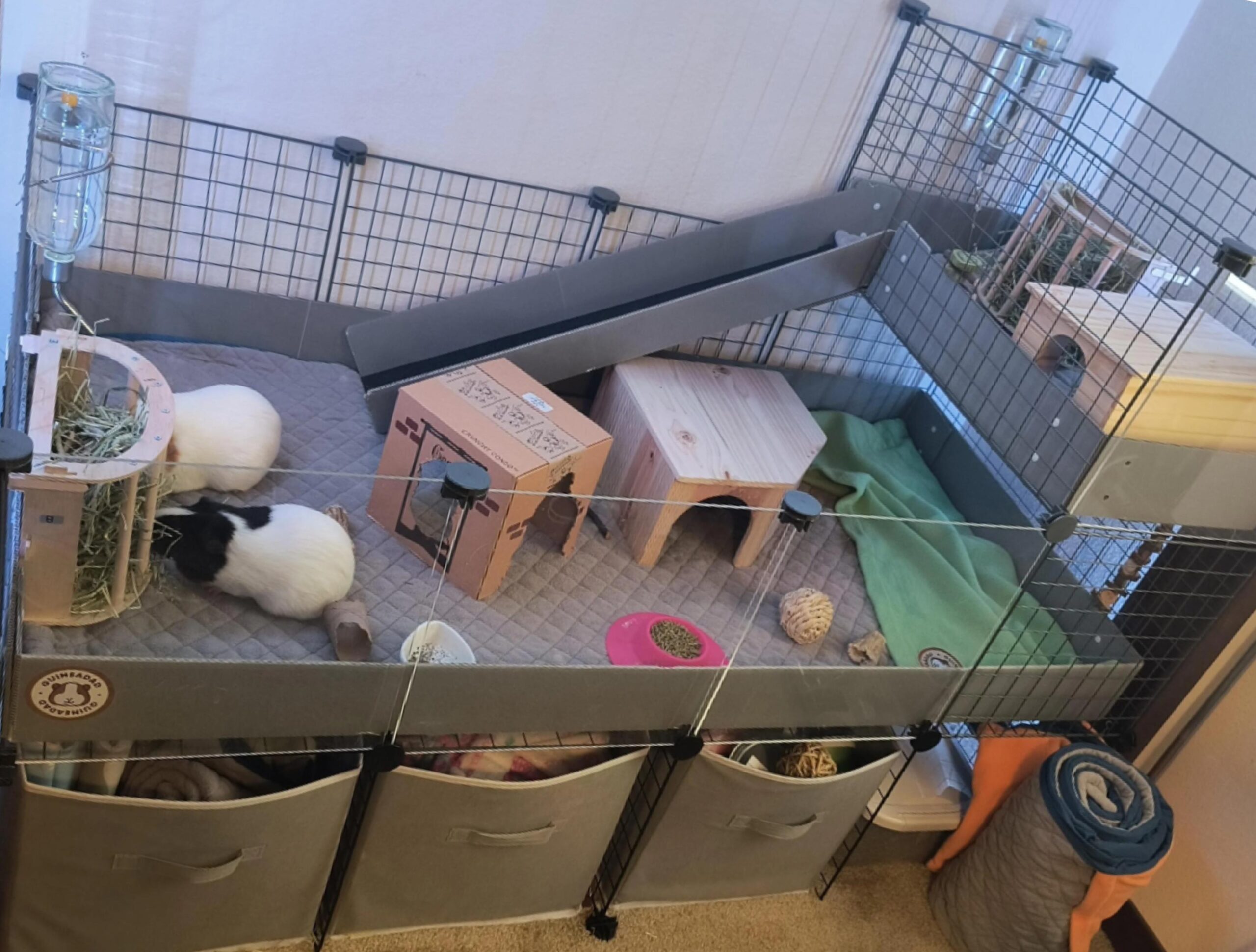
MINIMUM HABITAT SIZE:
2ft x 4ft, 8sq ft 1 or 2 guinea pigs
2ft x 5ft, 10sq ft 2 or 3 guinea pigs
2ft x 6ft, 12sq ft 3 or 4 guinea pigs
A pair of guinea pigs will need a minimum 2ft x 4ft, 8sq ft living space when enclosed, preferably 2ft x 5ft. For each additional guinea pig add 2-4 sq ft to their living space to maintain a healthy and harmonious environment and prevent fighting and bullying due to resource guarding.
Cages and hutches DO NOT provide enough room for guinea pigs. This can lead to frustration and stress which presents as pacing, excessive squeaking, loud cage chewing and bar rattling, and aggression towards cage mates due to resource guarding. Guinea pigs that are confined to small cages often become withdrawn or even depressed, losing interest in food, play, and interaction. Because they do not have enough room to exercise they are prone to obesity, heart disease, and infections. Guinea pigs kept in hutches also frequently develop bumble-foot.
